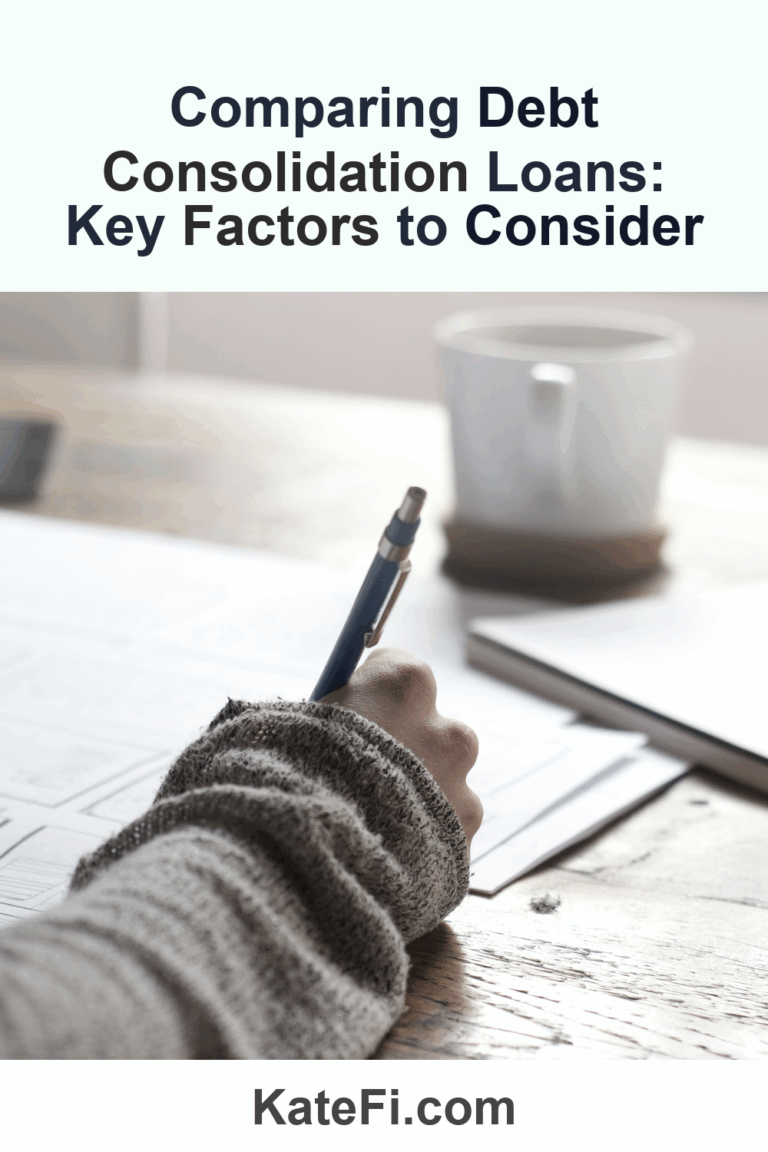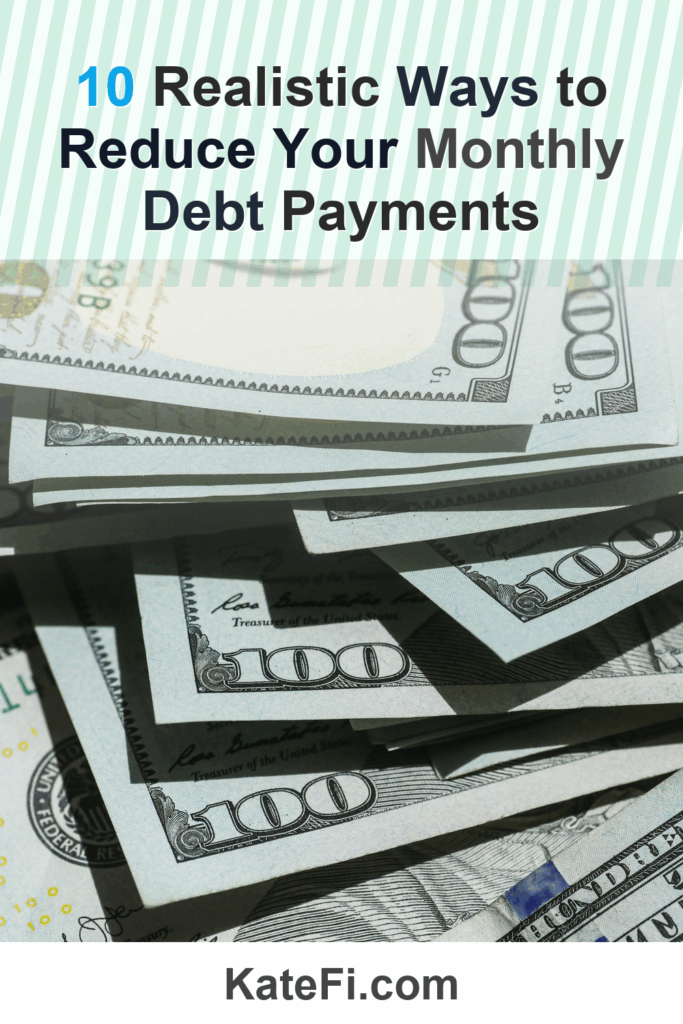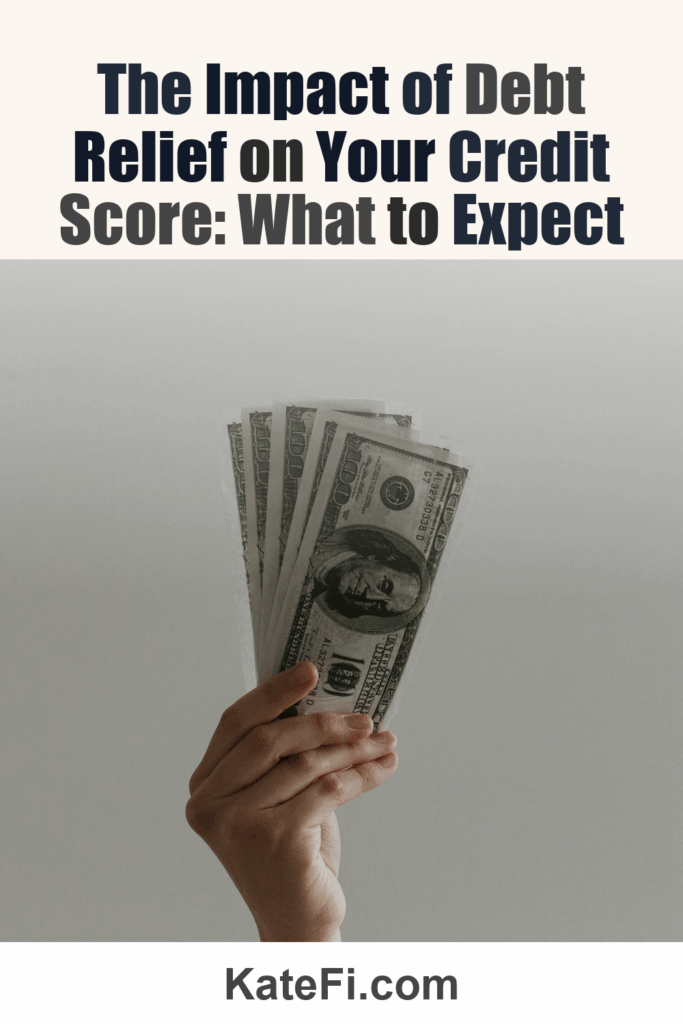Lower Your Unsecured Debt
If you have $5,000+ in credit card or personal loan debt, a free consult can review options like settlement or hardship plans.
Love our content? Show your support by following us — pretty please!🥺
FOLLOW ON PINTEREST
Hi! I’m Kate, the face behind KateFi.com—a blog all about making life easier and more affordable.
- One-on-one call to review your debts and goals
- See potential monthly payment reductions
- No obligation to enroll
Not available in IL, KS, OR, TN, UT, WV.
Comparing Debt Consolidation Loans: Key Factors to Consider
Debt can feel overwhelming, especially when multiple bills and interest rates collide. If you’re looking for a strategy to streamline your finances, a debt consolidation loan might be the solution you need. However, navigating your options can be daunting. This guide will break down essential factors to consider when comparing debt consolidation loans, and will equip you with helpful scripts and checklists to make the process easier.
1. Understand What Debt Consolidation Loans Are
Before diving into the details, let’s clarify what a debt consolidation loan is. Simply put, it’s a single loan that combines multiple debts into one. This means you can simplify your payments, usually at a lower interest rate than your existing debts.
Why consider this? Debt consolidation can reduce monthly payments and help you manage your budget more effectively. However, it’s important to weigh the pros and cons before making a decision.
✅ See If You Qualify for Debt Relief
2. Interest Rates: Shop Around
One of the primary factors to compare when considering a debt consolidation loan is the interest rate. Different lenders offer various rates based on your credit score and financial history. Here’s a quick comparison table to illustrate this:
| Lender Type | Average Interest Rate | Ideal Credit Score |
|---|---|---|
| Credit Unions | 6% – 12% | 650+ |
| Online Lenders | 5% – 36% | 580+ |
| Banks | 6% – 15% | 700+ |
Make sure to do thorough research and seek pre-approval from multiple lenders. This step allows you to compare offers without harming your credit score.
3. Fees and Other Costs
Not all loans are created equal when it comes to fees. Some lenders may charge origination fees, prepayment penalties, or annual fees. These costs can significantly affect your overall repayment amount. When comparing options, calculate the total cost of each loan by adding up the interest and fees.
4. Loan Terms and Repayment Plans
Understanding the terms and repayment plans is crucial. Loans typically range from two to seven years. Here’s a checklist of questions to consider:
- What are the monthly payment amounts?
- Is there a flexible repayment option?
- Are there penalties for missed payments?
- Can I pay off the loan early without a penalty?
Knowing the answers to these questions can help you find a loan that fits your budget and lifestyle.
✅ See If You Qualify for Debt Relief
5. Credit Impact: The Good and the Bad
It’s crucial to understand how debt consolidation may impact your credit score. Initially, applying for a new loan may result in a hard inquiry that can slightly lower your score. However, over time, consolidating your debts can lead to a better credit utilization ratio, especially if you keep your old accounts open and paid on time.
Consider gathering the following documents for a faster loan review:
- Recent pay stubs
- Bank statements
- Identification documents
- Details of your existing debts
6. Validating Your Debt
Once you’ve considered the terms of potential loans, you may receive calls from debt collectors. It’s essential to know your rights and how to validate your debts effectively.
Here’s a quick collector call script you can use:
“Hello, my name is [Your Name]. I received a call regarding a debt. Can you please provide me with the details of this debt, including the amount owed and the original creditor?”
Using this script ensures that you’re well-informed about your debts before proceeding with a consolidation loan.
7. Additional Strategies for Debt Relief
While debt consolidation loans can be effective, they are not the only option. Other strategies include:
- Debt Settlement: Negotiating to pay a reduced amount on your debts.
- Credit Counseling: Working with a counselor to create a debt management plan.
- Bankruptcy: A legal process that can discharge some debts but can have long-lasting effects on your credit.
It’s worth exploring these alternatives to find the best solution for your situation. If you’re uncertain about the best approach, getting a free consultation can provide you with valuable insights tailored to your needs.
✅ See If You Qualify for Debt Relief
8. Support Networks and Resources
Don’t underestimate the power of community and support networks when dealing with debt. Resources such as online forums, local financial literacy workshops, and even social media groups can provide emotional support and practical advice. Connect with others who have successfully managed their debt for encouragement and tips.
9. Monitor Your Progress
After securing your debt consolidation loan, it’s important to stay on track. Set reminders for payments and periodically review your finances. Consider creating a monthly budget to monitor spending and savings, allowing you to keep a clear path towards financial freedom.
Conclusion: Your Path to Debt Relief
Debt consolidation loans can be a useful tool in your debt relief journey, but they require careful consideration and comparison. By focusing on key factors such as interest rates, fees, loan terms, and the potential impact on your credit score, you can make an informed decision that suits your financial situation.
Don’t hesitate to reach out for professional guidance. A free consultation could be the first step toward a brighter financial future. Remember, you are not alone in this journey—there are resources and support systems available to help you navigate your way out of debt.
Important: This content is for education only—not legal, tax, or financial advice. Results and eligible programs vary by situation and state. Fees apply if you enroll and complete a program. Debt relief can affect credit; missed payments may lead to collections/lawsuits. Not available in IL, KS, OR, TN, UT, WV.
Take action today and start your journey towards debt relief. With the right tools and information, you can regain control over your financial future!
Understand pros/cons of settlement vs consolidation vs DMP for your exact mix of debts.
Not available in IL, KS, OR, TN, UT, WV.
👉 Start Your Free Debt Relief Review
Not available in IL, KS, OR, TN, UT, WV.
What You’ll Learn on the Call
- Estimated timeline and monthly payment range
- How credit may be affected in the short term
- What documents to gather to move faster
Not available in IL, KS, OR, TN, UT, WV.






















